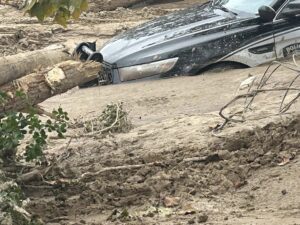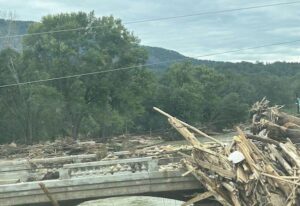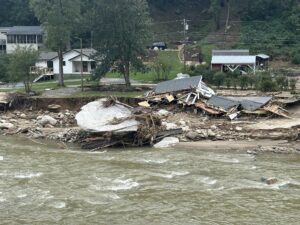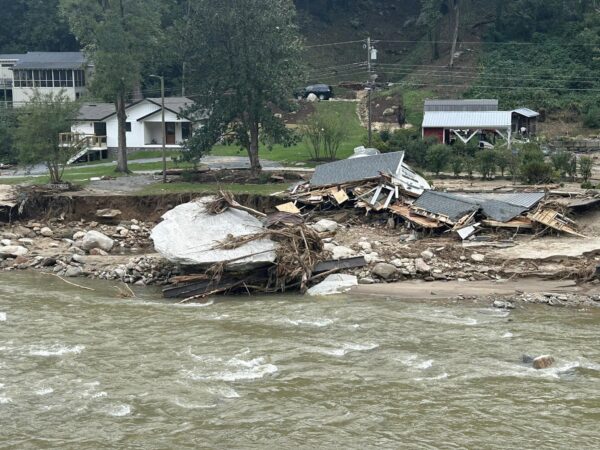Rep. Brenden Jones of Columbus County is no stranger to natural disasters.
With a business in Fair Bluff and home in Tabor City, as well as close ties throughout the county, Jones is familiar with the destruction from hurricanes such as Florence and Matthew. Jones spent time on the ground during both storms and afterward, organizing relief efforts and cleaning up, and later worked to bring state and federal assistance to storm damaged areas.
What Jones said he saw Monday in western North Carolina was astonishing, he said. Hurricane Helene brought 29 inches of rain to some parts of the North Carolina mountains, and has left thousands homeless.
“You cannot imagine the depth of the destruction,” Jones said. “What we had in Columbus was bad enough. Some of these people have even less left to salvage.”
Jones and Speaker of the House Tim Moore had an aerial tour of some of the damage to help determine how the legislature can best help the 25 counties ravaged by Helene.
“There are entire towns that are gone,” he said. “Some of those quaint little places where the businesses, the mom and pop stores, hung off the sides of mountains – what’s left there is holding on by hopes and dreams, that’s about it.”
Weather conditions prevented a planned Sunday flight through the area, Jones said. On Monday, Jones said he and Moore were shocked by what they saw.
“There was a Christmas tree farm where the tops of the trees were all brown,” he said. “They had been underwater and the mud had settled on them. An apple orchard was picked up and moved, piled up against a house maybe a quarter mile away.”
The river feeding Lake Lure has completely changed course, Jones said.
“Where there was a river is now nothing but mud, debris and silt. Never mind all the damage to the piers and boats. I have no idea how many boats were destroyed, or how they’re going to clean up the mess.”
While the immediate needs of food, water, shelter, and medicine are the most urgent, Jones said state leaders are looking at the longterm picture as well.
“Much of our state’s tomato crop is grown there,” he said. “That’s gone. The Christmas tree farms? Gone. The apple crop is mostly gone. Tourism? There’s nothing to see, if people could even get there. How are people going to survive?”
Ice and fuel are precious commodities right now, Jones said, along with water. The best way to help in the near future, Jones said, is to donate to a reputable agency or nonprofit.
“I understand the desire to take off and go help,” he said, “but we can’t right now. There’s no fuel. If someone goes up to the disaster area without a specific destination, and they run out of gas – there is no gas to buy, and no electricity to pump it. That person then becomes a victim in need of assistance as well.
“There are legitimate assistance groups out there working very hard right now. The best way to help is to donate to them. There will be time enough later for volunteers, unfortunately.”
Legislators will return Oct. 9 to focus on assistance for the hardest hit areas, Jones said.
“This is going to be felt for years,” he said. “It’s heartbreaking. This is going to be difficult to come back from, but it’s so gratifying to see so many people stepping up to help, especially right here at home. We know what it’s like.”








